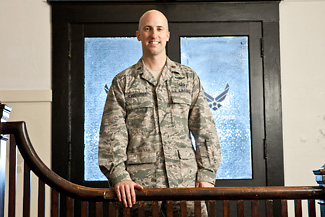
Photo by Austin Thomason, U-M Photo Services.
Maj. Jonathan Liscombe learned most of his life lessons on the basketball courts of Hampton, Va. “This is where I learned my street smarts,” says Liscombe, assistant professor of the Air Force Officer Education Program and operations flight commander at U-M’s Air Force Reserve Officer Training Corps (ROTC).
One of the main lessons he learned encompassed teamwork, an idea he would carry from the streets to the Air Force.
Liscombe became fond of basketball when his father introduced him to the sport at the age of 7. “Basketball was what I excelled at. I’m not one of the best basketball players in the world or anything, but it became a passion of mine early on,” he says.
After playing the sport for years, Liscombe began to understand the importance of a team. “That’s what we do when we go out there and play basketball. Every person has a role to contribute to the success of that team because if one person doesn’t help, it hurts that team,” he says.
The team concept however, was not confined to the courts. As Liscombe would realize, teamwork also was important to the success of the military.
Born to an enlisted Army father, Liscombe was accustomed to the military lifestyle. “I’m a military brat. I was born in Germany, moved to Japan (and) lived there for seven years, then spent the rest of my life in Virginia; but I called the world home,” he says.
What moment in the classroom or lab stands out as the most memorable?
President Barack Obama reading the Oath of Office to cadets at the 2010 Spring Commencement.
If you were selling Ann Arbor to a faculty colleague, how would you describe what it has to offer?
Ann Arbor has a big city feel to it but with low crime and also a great appreciation of intellect, arts and diverse cultures.
What is your favorite spot on campus?
Michigan Stadium, nothing like being in the legendary Big House.
What inspires you?
People who sacrifice their well-being and wealth for others.
What are you currently reading?
“The Lost Peace” by Robert Dallek.
Who had the greatest influence on your career path?
My father served in the Army for two decades and taught me the importance of service and excellence.
After obtaining a business management degree at Old Dominion University, he wanted to return to the world he called home. “My father’s service propelled me to continue the tradition to serve in the military, and I wanted to do something honorable and to see the world,” Liscombe says.
Once he finished Officer Training School, Liscombe was sent to the Space and Missiles Center at Los Angeles Air Force Base as an acquisitions officer.
After his assignment in Los Angeles, he was transferred to Hanscom Air Force Base in Boston. When he completed his assignment, which included several temporary duties throughout Europe, Liscombe was assigned to U-M, where he became the operations flight commander for the Air Force ROTC.
“My focus is to develop these cadets into strong leaders and leave the Air Force just as strong as when I joined,” Liscombe says. To develop them, he teaches cadets Air Force history, and leadership fundamentals using the skills and knowledge he has learned throughout his Air Force career and while earning his master’s degree in history at Harvard University.
At the end of training, Liscombe welcomes cadets to the Air Force team at their commissioning, an inspiring moment for him. “You have young cadets, raising their hands, committing themselves to four years for active duty … it makes you proud,” he says.
With constant assignments and countless temporary duties, Liscombe’s street smarts have held steadfast. “Whether it’s here in AFROTC at the university, on an acquisitions program or at a fighter wing, the team is the number one priority; everyone working together and supporting each other is essential to success,” he says.
The weekly Spotlight features faculty and staff members at the university. To nominate a candidate, please contact the Record staff at [email protected].

